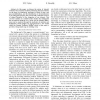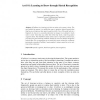528 search results - page 20 / 106 » What Can We Learn Privately |
CEC
2009
IEEE
14 years 2 months ago
2009
IEEE
—In this paper we discuss the notion of situated evolution. Our treatment includes positioning situated evolution on the map of evolutionary processes in terms of time- and space...
CCS
2010
ACM
13 years 12 months ago
2010
ACM
Private Information Retrieval (PIR) protocols allow users to learn data items stored at a server which is not fully trusted, without disclosing to the server the particular data e...
PKC
2010
Springer
13 years 11 months ago
2010
Springer
In many practical settings, participants are willing to deviate from the protocol only if they remain undetected. Aumann and Lindell introduced a concept of covert adversaries to f...
SG
2010
Springer
14 years 21 days ago
2010
Springer
iCanDraw is a drawing tool that can assist novice users to draw. The goal behind the system is to enable the users to perceive objects beyond what they know and improve their spati...
COLING
2007
13 years 7 months ago
2007
eneral, the notion that computation in a serious sense, not just as some highly abstract grounding or, maybe, politically correct meta-reference, has something important to say to ...


